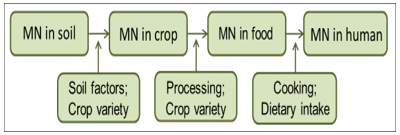Micronutrient management for improving harvests, human nutrition, and the environment

Micronutrient deficiencies in soils limit crop yields and nutritional quality, which in turn negatively affect human health. Especially in sub-Saharan Africa, soils have multiple micronutrient deficiencies which makes soils non-responsive to NPK fertilization. Poor crop yields in combination with diets that are mainly based on staple crops, causes widespread micronutrient deficiencies among the population, with severe health problems as a consequence. Worldwide over 2 billion people suffer from iron, zinc and/or other (multiple) micronutrient deficiencies. Iron deficiency anemia, for example, causes 115,000 maternal deaths per year.
A suggested strategy to alleviate micronutrient deficiencies is agronomic biofortification, particularly of staple foods. This is the fertilization of soils or plant leaves with mineral micronutrient fertilizers in order to increase certain micronutrient contents in the edible part of crops. The impact of agronomic biofortification largely depends on the bioavailability of micronutrients throughout the entire pathway from soil to plant, from plant to food and uptake by the human body. Factors that determine bioavailability are mainly soil conditions, crop variety, food processing, concentration of micronutrient inhibitors or enhancers in food, dietary intake, the forms of micronutrients in food, interactions among nutrients, and physiological condition of individuals.
 Schematic overview of micronutrient (MN) pathway. Based on Mayer et al. (2011).
Schematic overview of micronutrient (MN) pathway. Based on Mayer et al. (2011).
A new publication by Anne W. de Valença and Anita Bake of Wageningen University, in collaboration with Food & Business Knowledge Platform and IFDC, provides an overview of existing academic literature about these effects of agronomic biofortification on yields, nutritional quality of crops and human health. The essay has served as basis for discussion during a workshop on April 5, 2016, about the potential of improving micronutrient management throughout the entire pathway from soil to plant, plant to food, and uptake by the human body. The workshop was attended by over 50 experts from different disciplines and backgrounds; a full report of the workshop will be published in the next newsletter of the Food & Business Knowledge Platform.
Download the executive summary of the essay here.
Find the report of the workshop of April 5, 2016 here.





